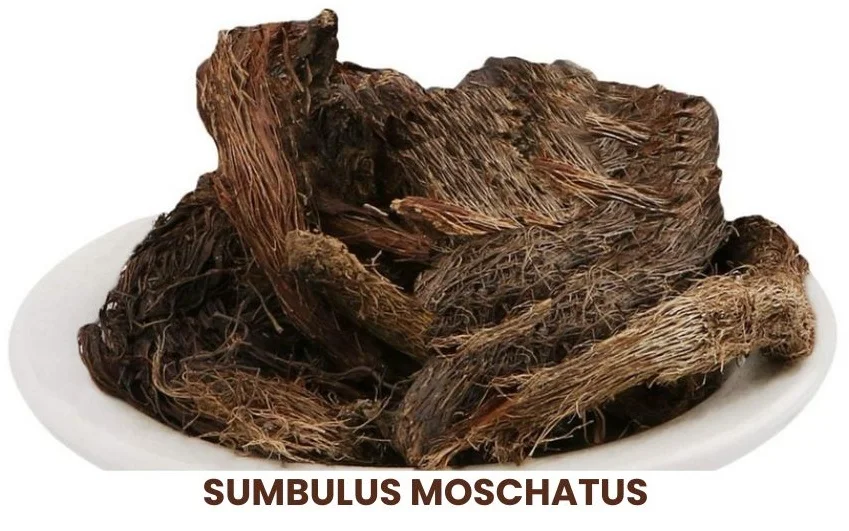Sumbulus Moschatus/ Sumbul Ferula, or Musk-root, is derived from the root of the Ferula sumbul plant.
It is primarily used in homeopathy for its effects on hysterical and nervous disorders, neuralgic conditions, and various cardiac issues.
It is valued for its ability to address numbness, insomnia, and functional heart disorders.

SOURCE INFORMATION
Scientific Classification
- Botanical Name: Ferula sumbul
- Common Name: Musk-root
- Family: Apiaceae (Umbelliferae)
Origin
- Native to Central Asia, particularly in the mountainous regions of Afghanistan, Iran, and surrounding areas.
Historical Facts
- Historically, musk-root has been used in traditional medicine for its calming effects and its ability to treat various types of nervous disorders and heart conditions.
DRUG PATHOGENESIS
Sumbulus Moschatus influences multiple systems in the body:
- Nervous System: It affects the nervous system, leading to emotional instability, nervous palpitation, and unusual sensations.
- Cardiovascular System: It helps with cardiac disorders, including irregular pulse and cardiac asthma.
- Respiratory System: It is used for asthma and spasm in the throat.
- Digestive System: It helps with issues related to belching and mucus in the throat.
- Urinary System: It affects urine quality, sometimes causing an oily pellicle on the urine surface.
KEY CHARACTERISTICS
- Emotional and Mental State: Emotional and fidgety, with mistakes in writing and calculation. Experiences a sensation of water dropping down the spine.
- Cardiac Symptoms: Nervous palpitation, irregular pulse, and pain in the left arm.
- Respiratory Issues: Asthma, choking constriction, and tenacious mucus in the throat.
- Urinary Symptoms: Presence of an oily pellicle on the urine surface.
- Other Symptoms: Numbness, especially on the left side, and insomnia associated with delirium tremens.
DETAILED ORGAN SYMPTOMS
HEAD
- Emotional State: Emotional, fidgety, and prone to mistakes in writing or adding.
- Daily Variation: Dullness in the morning, clearer mental state in the evening.
- Nasal Symptoms: Tenacious yellow mucus in the nose.
THROAT
- Constriction: Choking constriction with constant swallowing.
- Belching: Gas belching from the stomach.
- Spasm: Spasm of the pharyngeal muscles with tenacious mucus.
HEART
- Palpitations: Nervous palpitation and cardiac asthma.
- Pain: Neuralgia around the left breast and hypochondriac region, with aching in the left arm.
- Breathlessness: Shortness of breath on exertion, irregular pulse.
FEMALE
- Ovarian Neuralgia: Pain and discomfort in the ovaries.
- Climacteric Symptoms: Flushes and abdominal distension during menopause.
URINARY
- Pellicle: Oily film on the surface of the urine.
MODALITIES
- Worse: Active exercise, especially on the left side.
- Better: Rest and avoiding physical exertion.
RELATIONSHIP WITH OTHER DRUGS
Compare,
- Asafoetida: Similar symptoms of nervous disorders and cardiac issues.
- Mosch: Shares some similarities in treating nervous and cardiac symptoms.
DOSE
- Homeopathic Use: Tincture or up to the third potency.
- Specific Recommendations: For arteriosclerosis, Dr. W. McGeorge recommends the 2x potency every 3 hours.
Frequently Asked Questions (FAQs)
What conditions does Sumbulus Moschatus treat?
- It treats nervous and hysterical symptoms, neuralgic affections, cardiac disorders, asthma, and ovarian neuralgia.
How is it administered in homeopathy?
- It is administered as a tincture or in potencies up to the third attenuation.
Are there any known side effects?
- Side effects may include temporary worsening of symptoms, especially with physical exertion.
How does it help with heart issues?
- It improves nervous palpitation, irregular pulse, and cardiac asthma.
Glossary
- Neuralgia: Severe pain along the course of a nerve.
- Climacteric: Pertaining to the period of menopause.
- Pellicle: A thin film or layer on the surface of a liquid.
- Delirium Tremens: A severe form of alcohol withdrawal characterized by tremors, agitation, and hallucinations.
